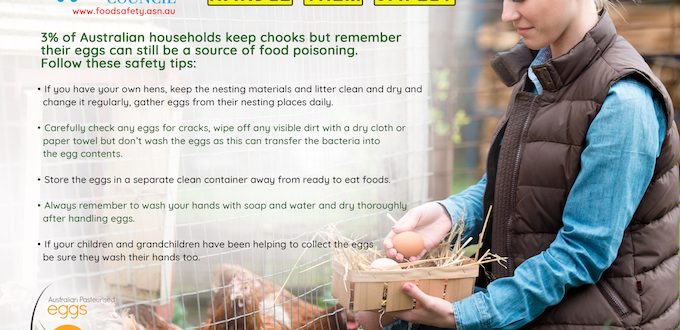
Australian Food Safety Week 9-16 November – Excellent Eggs handle them safely
The Food Safety Information Council today released Omnipoll research that shows 43% of Australian adults say they don’t always wash their hands after handing raw eggs.
Cathy Moir, Council Chair, said that eggs are a simple, delicious, cost effective and nutritious part of our diet but egg shells can be contaminated by Salmonella on the outside when they are laid which can easily be transferred to your hands and contaminate other foods that won’t be cooked.
‘Our research shows that people are far more likely to always wash their hands after eating other raw foods than eggs, for example far fewer respondents (23%) said they didn’t always wash their hands after handling raw meat or poultry.
‘People need to remember that shell eggs, like any raw food, can be a risk for food poisoning so always wash your hands after handling eggs. Don’t use the eggshells to separate egg yolks and whites especially if you aren’t going to fully cook the egg dishes you’re making, invest in an egg separator instead and use it.
‘Some people are more at risk of becoming ill if they eat food contaminated with food poisoning bacteria e.g. youngsters, elderly, and immunocompromised people. Another alternative for these vulnerable groups and other consumers who want to eat eggs and egg dishes that aren’t fully cooked is to use pasteurised eggs and egg products. Ask for them at your supermarket.
‘Handwashing after handing eggs and chickens is especially important for those 3% of Australian households who say that they keep hens at home as home grown eggs can also be a source of food poisoning. Always remember to wash your hands with soap and water and dry thoroughly after handling eggs, the chickens and their litter and after working with the hens. if your children, grandchildren or friends have been helping to collect the eggs or handling the chickens, be sure they wash their hands too.
‘If you have your own hens follow these simple food safety tips:
- keep the hen’s nesting materials and litter clean and dry and change it regularly
- gather eggs from their nesting places daily
- carefully check any eggs for cracks, wipe off any visible dirt with a dry cloth or paper towel but don’t wash the eggs as this can transfer the contamination into the egg contents
- store eggs in the refrigerator in a separate clean container away from ready to eat foods
‘The Food Safety Information Council would like to thank Australian Pasteurised Eggs our Gold sponsor for Australian Food Safety Week, as well as CSIRO, Food Standards Australia New Zealand, Animal Medicines Australia, state and territory representatives and our members for providing the evidence base for this information,’ Ms Moir concluded.
For more information about Australian Food Safety Week see https://foodsafety.asn.au/australian-food-safety-week-2019/
Media contact:
Lydia Buchtmann, Food Safety Information Council, 0407 626 688 or info@foodsafety.asn.au
The Food Safety Information Council is a health promotion charity and Australia’s leading disseminator of consumer-targeted food safety information

